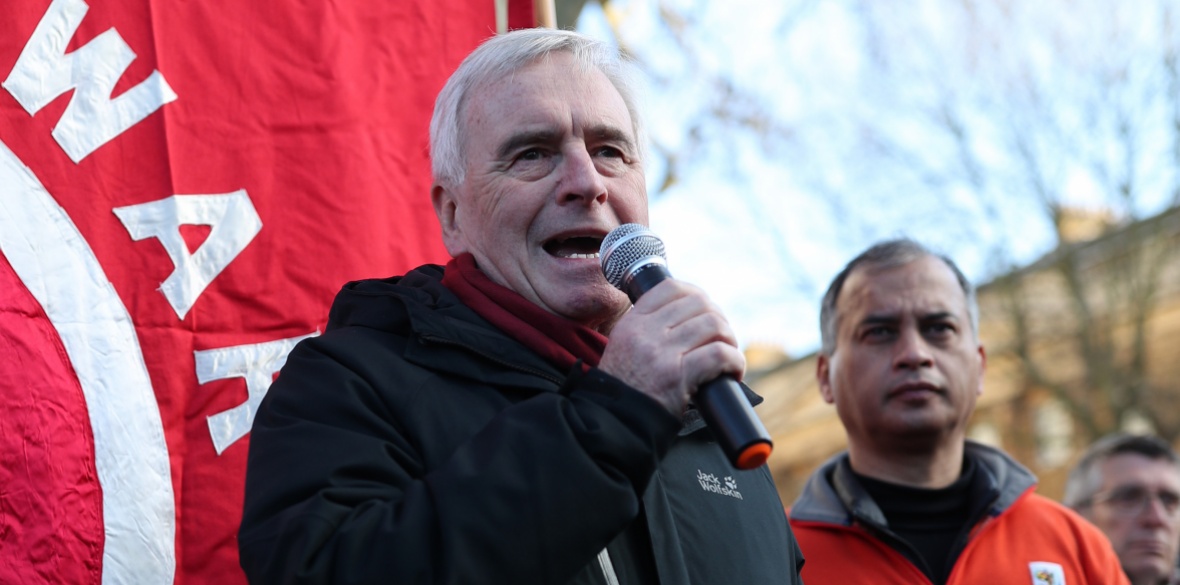JOHN McDONNELL’S seminar programme on Labour’s future will take place among multiple discussions on the party’s mauling by the Conservatives at last month’s election.
Serious strategising on how the left can win is certainly needed. The Labour Party under Jeremy Corbyn had bucked the trend of European social democracy, with parties collapsing to single-digit levels of support from France’s Socialists to Greece’s Pasok, and in some respects it still does.
In membership terms it is the biggest political party in Europe.
But December’s election result aligned Britain clearly with the course of politics in the US and most European countries, in which collapsing faith in the established political and economic order is successfully exploited by the hard right while the left flounders.
We need a no-holds-barred debate over why, which should include the fullest possible exploration of these issues in the contests for leader and deputy leader of the Labour Party.
While the race for the former is on, it must be hoped that the Socialist Campaign Group’s nomination for deputy leader Richard Burgon gains the necessary trade union nominations to get onto the ballot to ensure there is a contest and a full debate on the party’s direction and priorities.
For McDonnell the culprit is the “era of the finance, data-media complex, capable of combining the traditional financial clout over economic decision-making by governments with the ability to use its ownership and influence of the various media platforms to decisively influence decision-making and even elections.”
Some of this is undoubtedly true. The Morning Star has discussed the trend by corporate giants including Facebook and Twitter to police content politically.
The British broadcast and print media went to war for the Conservatives in the last election, and as the only co-operatively owned socialist daily in the country, we wholeheartedly agree that our movement needs to counter the influence of corporate propaganda.
However, there’s a difference between recognising the fact of ruling-class hegemony over the media and the need for a working-class media, promoting class consciousness and class struggle, and the liberal tendency to blame voter behaviour it disapproves of on “fake news” and manipulation by shadowy forces.
The latter trend has been prominent in responses to Donald Trump’s electoral victory over Hillary Clinton in the US and in reactions to the Brexit vote in this country. It is not only patronising, it prevents the left from seriously addressing its own weaknesses.
One of those weaknesses in Labour’s case was its approach to Brexit. With 52 of the 54 seats lost to the Tories being Leave-voting, the commitment to a second referendum must rank among the mistakes that McDonnell describes as “pretty obvious.”
The disastrous embrace of the EU reflects a failure to do exactly what McDonnell argues we must — analyse the evolution of capitalism itself and how it is changing the political game.
One of the biggest obstacles in the path of a socialist government seeking to plan economic development, provide publicly owned services or combat climate change is the tangled web of international corporate treaties, from GATS to Ceta and Nafta to the Trans-Pacific Partnership.
These impose corporate patents, enshrine “access all areas” rights to corporations seeking to exploit economic sectors and systematically limit the purview of political action by forcing countries to adapt themselves to the needs of capital.
The European Union is an integral part of that network and its “four freedoms” relating to capital, goods, labour and services massively restrict the freedom of governments to determine independent economic policies.
“There is no democratic choice against the EU treaties,” as Jean-Claude Juncker put it.
McDonnell argues for a “culture war” which we can win with “leading edge creativity.” But that is no substitute at all for challenging the actual existing mechanisms by which corporate power is exercised. Socialism entails public ownership and control of the economy.
A serious strategy for confronting capitalism cannot ignore this. But so far Labour largely has.











